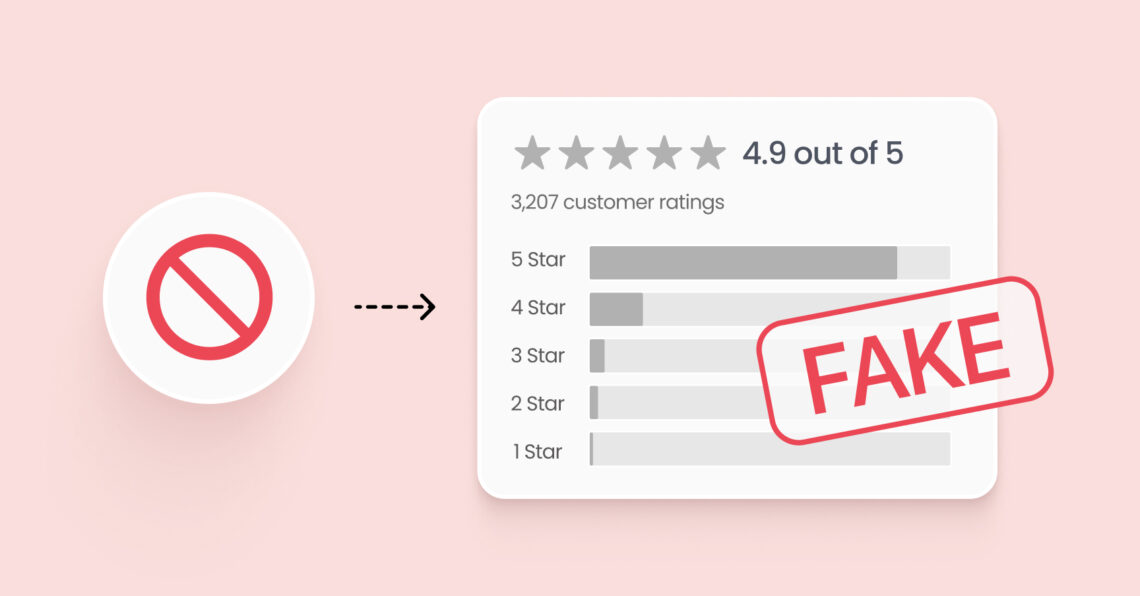In light of the Federal Trade Commission’s (FTC) recent ruling against fake reviews and deceptive testimonials, it’s essential for businesses to understand the implications and how they can ensure compliance. At Birdeye, we are fully committed to supporting our clients in navigating these new regulations while continuing to enhance their online reputations with integrity.
Understanding the FTC’s new ruling
The FTC’s final rule explicitly prohibits the use of fake or misleading reviews to manipulate a company’s online reputation. This includes buying positive reviews, using AI to generate false reviews, and suppressing negative feedback.
The rule is clear: businesses must present an honest and transparent view of customer feedback.
Here’s a breakdown of the six key points and how they impact businesses:
1. Banning fake reviews: The FTC has a clear message—fake reviews won’t be tolerated. This includes AI-generated reviews, fabricated positive feedback, and attempts to manipulate online reputation through false reviews. The new ruling stops businesses from creating, selling, or buying fake reviews. They can’t ask employees to write them either. And if a business shares fake reviews, even if they didn’t know they were fake, they can get in trouble.
2. Buying reviews: Businesses can’t pay people to write fake reviews, whether they’re positive or negative. This includes offering incentives that depend on the reviewer’s sentiment. Even if it’s implied, rather than directly stated, it’s still not allowed.
3. Disclosing insider reviews and testimonials: As per the new FTC ruling, company officers and managers must clearly disclose their connection with the business when reviewing products or services. Businesses also can’t share reviews from insiders without proper disclosure. If managers ask their family members, employees, or agents to write reviews, they must be honest about it. They also can’t ask employees or agents to ask their own family members to write reviews without being upfront about it.
4. Company-controlled review websites: Businesses can’t deceive consumers by claiming that a review website they control is independent. If a company owns or runs a site that reviews products or services, it must clearly disclose its connection.
5. Review suppression: Companies are no longer allowed to suppress or remove negative reviews through intimidation, false legal threats, or other manipulative tactics. The rule ensures that consumers have access to a balanced and complete picture of customer experiences, not just handpicked positive reviews.
6. Fake social media indicators: Businesses can’t buy or sell fake social media metrics, such as inflated likes, followers, or social media reviews generated by bots or hijacked accounts. This rule applies when someone knowingly or unknowingly buys fake credentials to boost their business reputation and tries to pass them off as real.
Birdeye’s role in promoting authenticity
At Birdeye, we firmly believe that authentic reviews are essential for building trust and credibility with consumers. Our tools, like the Reviews site widget and social media cross-posting features, are designed to help businesses showcase their customer feedback effectively. However, we understand that these tools must be used responsibly under the new FTC guidelines.
Reviews site widget
While it could be argued that selecting the setting to share only positive reviews on your site may be seen as a misrepresentation by the client (and, by extension, Birdeye) about the integrity or source of the reviews, we want to assure you that at Birdeye, we are committed to upholding the highest standards of integrity in enhancing your online reputation.
We take all reasonable steps to ensure only authentic reviews from genuine customers are solicited, drawing from your customer, appointment, and sales data. Our reviews widget defaults to displaying all reviews, regardless of rating, but if you opt to showcase only positive reviews, that choice is entirely up to you, with the understanding of potential implications. You are in complete control of the widget and, as such, have the responsibility to use it in compliance with this new FTC rule, other FTC rules and guidelines, and all other applicable laws.
Social media cross-posting
Birdeye enables you to showcase your top reviews on your social media profiles in full compliance with FTC regulations. Our social cross-posting tool automatically shares your best reviews across various social media platforms, enhancing your credibility with potential customers and putting your best feedback front and center.
However, since the new rule isn’t yet enforced, consider posting a disclaimer on your social site clarifying that you’re posting hand-picked reviews, a sample of your company’s reviews, or the positive reviews that best represent your business. Remember, you’re in control of what is posted – Birdeye is just the tool that allows you to post more efficiently, through a centralized dashboard.
AI features
Birdeye uses AI functionality to solicit and respond to reviews, but it does not use AI to post reviews. If we discover or have reason to believe a review was posted using AI, we’ll take immediate action to remove it from our site. Our goal is to maintain the authenticity and trustworthiness of reviews, ensuring they come from real customers with genuine experiences.
Upholding ethical standards
At Birdeye, we’re dedicated to leading by example in the fight against fake reviews and fraudulent advertising. We strongly advise against offering incentives for reviews, as genuine customer feedback is crucial for both enhancing your online reputation and driving meaningful improvements in business operations.
Your responsibility in compliance
As a trusted partner in online reputation management, Birdeye is committed to helping you build authentic relationships with your customers. Our platform provides you with the tools to solicit, monitor, and respond to reviews, but it’s your responsibility to use our tools in a way that complies with all applicable laws, including the FTC’s new “fake reviews rule.”
While we’re here to support you, we can’t ensure you’re using our tools correctly or provide legal advice. As the controller of our tools, you’re ultimately responsible for ensuring compliance and understanding the consequences of non-compliance. Therefore, we encourage you to familiarize yourself with these regulations and make informed decisions.

Originally published









